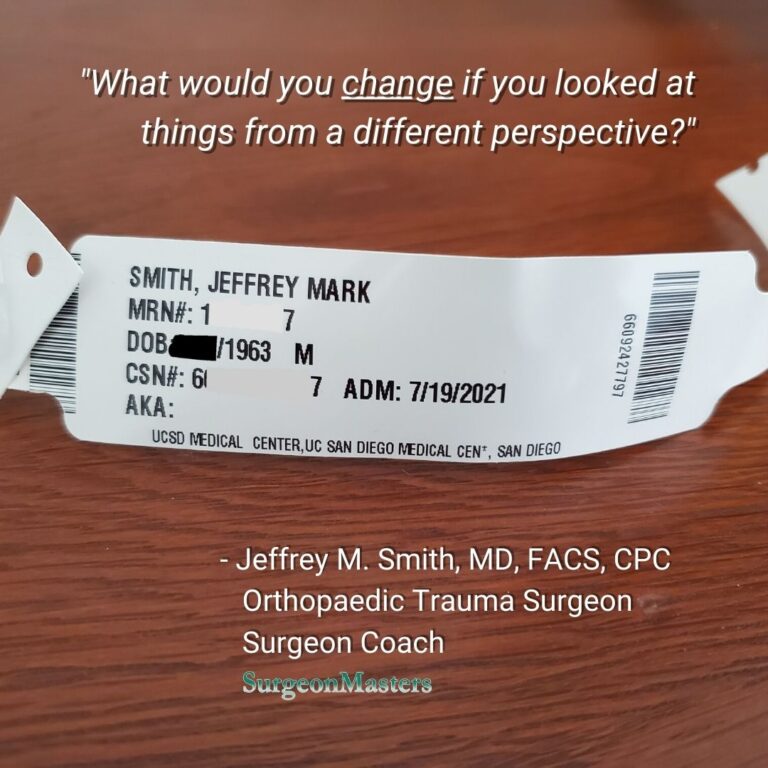In July, I had low back surgery (a right L5 -S1 discectomy and bilateral L5-S1 laminoforaminotomies) which in some part was due to years of performing surgeries with poor ergonomics in the operating room. As a surgeon undergoing surgery myself, I have been both a good patient and a not so good patient at the same time. Being “off work” has been really challenging! I don’t do well with idle time and have difficulty sitting still. I have performed countless procedures during my career as a surgeon, but going under the knife myself has been a valuable learning experience. Looking at experiences from another perspective can be eye-opening and valuable. Here are three ways we can gain that perspective:
- We can ask questions and listen with empathy.
- We can go through the experience ourselves.
- We can read about others’ experiences to appreciate a greater perspective.

Life of a Surgeon
I’m used to running 100 miles-per-hour 16-22 hours a day. Now that I’m recovering from surgery, each day poses different challenges. I am doing well not bending, stooping, twisting, and lifting. I am walking, driving short distances, and trying to do my rehab exercises. I am NOT taking call or operating but I am working a little. I did a little telemedicine POD#1. I saw patients in the clinic POD#7, 9 and 14.
I have enough to keep me occupied, yet I feel bored. Recovering from surgery has challenged my routine and my mindset. I have had to adjust from the lifestyle of a surgeon and it has been hard. I love being a surgeon and it turns out part of that love comes from burning the candle at both ends. Although I have made tremendous progress, I am still trying to figure out how to take care of myself. Here are a few examples of my yin and yang.
Old Jeff Mentality
I was hoping to have my surgery Monday afternoon, so I could squeeze in seeing my scheduled patients Monday morning. Some patients over the years complain about being rescheduled, and I was trying to minimize the number of patients that would impact. I was seeing consults up until 2am Monday morning before my surgery, and I got all my consults completed. Leaving things undone or for others to do can feel like you are dumping on others. It gave me peace to know that everyone received the early clinical management plans they would need for the next 24 hours.
Sacrificing productivity and/or forfeiting call days is not easy to do when it impacts gross revenue in many practice models. Machismo also sneaks in here. As I already know how hard I work, the main driver is overwhelmingly related to covering staff salaries and maintaining income in difficult financial times.
Coordinating with a colleague, we had a plan for who would get added on to the OR the next day.
Juggling my surgeon’s schedule, the OR schedule, and scheduling my own patients started getting too complicated. “Better late than never.” Everyone understood, except everyone but me thought I should have canceled that clinic the Monday prior or as soon as I knew I was having surgery that day.
While our recent heavy telehealth experience during Covid has demonstrated what is feasible, most patients still prefer to come in for their visit. Early postoperative patients have lots of questions, and the surgeon who did the surgery has a much easier time explaining what they did and what expectations the patient should have.
Not being in the operating room for 6 weeks is pretty disconcerting. While I have other skills, operating is something that I do well and really enjoy.
New Jeff Mentality
Healing without reherniation or reaggravating my condition is important to my long-term career and future hopes.
I never realized how many times we bend or twist in daily activities. Having the early post-op pain helped me learn to avoid doing so many things the wrong way.
Less overall activity will allow me to rest and truly recover. Doing too much too early is common in many patients. In my informal poll, it is even more common with physicians.
I did not end up giving in to the idea of trying to see patients the same day as my surgery. I will always care about my patients, and I will advocate for the care that they need for recovery. I don’t have to do it all by myself.
Healthcare demands that we hurry up and wait, and this means that we spend way too much time at work and unproductive. We are told by others to fill that time waiting with other things that help us feel productive. I need to carve out time for my personal life.
I am still highly interested in the well-being and care of my patients.
Looking at surgery from the perspective of a patient has allowed me to see my own healthcare differently in many ways. Slowing down and taking care of myself is just one of them. I have been trying for quite some time to shift more of my work time towards coaching. What I’ve realized is that I love helping surgeons optimize their life and practice. Even if I’m not directly involved in their patient care, I still impact patients recovering from surgeries through the great work of my colleagues.
What would you change if you looked at things from a different perspective?
